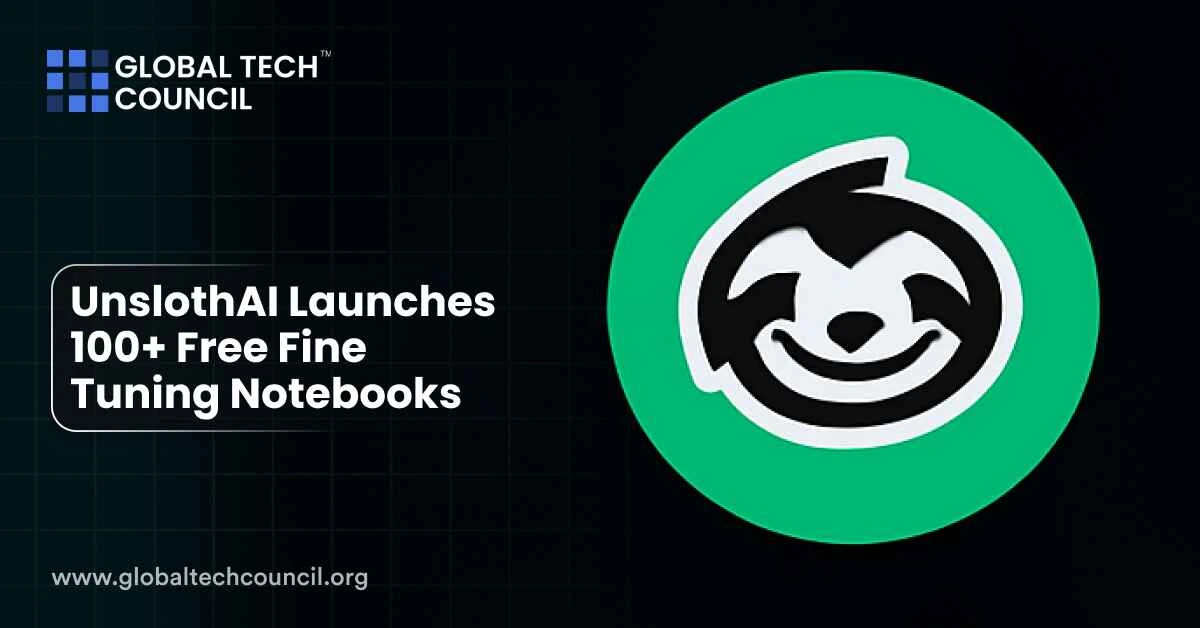
UnslothAI has released over 100 free fine-tuning notebooks that help anyone—from beginners to experienced developers—train large language models quickly, affordably, and without complicated setup. These notebooks cover every step of the fine-tuning process: from preparing your data to exporting a fully trained model.
Each notebook runs on platforms like Google Colab or Kaggle and supports popular models such as Llama, Qwen3, Gemma, Mistral, DeepSeek, and Phi-4. You don’t need a high-end GPU—just 3GB of VRAM is enough in many cases.
Let’s explore what’s inside, how it works, and why this release matters.
What Are These Notebooks?
These are pre-built Jupyter notebooks that guide users through:
- Loading datasets
- Fine-tuning models using techniques like QLoRA, DPO, or GRPO
- Evaluating performance
- Exporting models to popular formats like GGUF, Hugging Face, and vLLM
The notebooks are open-source, licensed under LGPL-3.0, and designed to make AI model training more accessible than ever.
What Models Can You Fine-Tune?
UnslothAI’s notebooks support a wide range of base models used for different tasks—chatbots, summarization, vision, code generation, and even text-to-speech.
Popular LLMs Supported in UnslothAI
| Model | Size Range | Notebook Features |
| Llama 3.1–3.2 | 1B to 11B | Chat, classification, SFT, DPO |
| Qwen3 | 4B, 14B | GRPO, ORPO, vision support |
| Mistral | 7B | SFT and DPO |
| Gemma 3 | 4B | Lightweight fine-tuning |
| Phi-4 | 14B | Text and logic tasks |
| DeepSeek-R1 | Various | Multi-modal and instruction use |
| Sesame-CSM | TTS/Voice | Text-to-speech training |
These notebooks don’t just support basic training—they include advanced optimization and export options so you can deploy the models in your own apps or systems.
Fine-Tuning Methods Available
UnslothAI’s notebooks include some of the most effective fine-tuning methods available today. These are the techniques that allow you to customize a model for your exact use case.
Key Methods:
- SFT (Supervised Fine-Tuning)
- QLoRA and LoRA
- GRPO, DPO, ORPO
- Continued pretraining
- Vision and multi-modal tuning
- TTS fine-tuning for speech models
These methods are powerful but often difficult to implement. UnslothAI simplifies it by turning them into plug-and-play notebooks.
Fine-Tuning Use Cases and Matching Methods
| Use Case | Fine-Tuning Method(s) | Recommended Notebook |
| Chatbot Training | SFT, QLoRA, GRPO | Llama 3.1 or Qwen3 |
| Code Completion | DPO, ORPO | Phi-4 or Mistral |
| Text Summarization | SFT, QLoRA | Gemma 3 or DeepSeek-R1 |
| Speech Synthesis | TTS training | Sesame-CSM |
| Multi-modal Tasks | Vision + GRPO | Qwen3 Vision or DeepSeek |
What Makes This Release Special?
UnslothAI isn’t the first to offer fine-tuning tools—but it’s one of the first to make the process this simple, this fast, and this lightweight.
You don’t need a powerful computer or server. You don’t need to install complex packages. You don’t need to build custom scripts.
You just open a notebook, follow the steps, and start training.
Why This Matters for Developers and Learners
Fine-tuning a model used to be reserved for well-funded teams with expensive GPUs. Now, with UnslothAI’s approach, students, indie developers, educators, and researchers can all experiment and build on top of powerful models—without breaking the bank.
If you want to understand how models learn, how to process training data, or how to evaluate model accuracy, a data science certification is a great next step.
And if you’re planning to use these models in business, product, or marketing roles, it helps to know how this tech fits into user journeys and workflows. That’s where a marketing and business certification can bridge the gap between AI development and customer impact.
For those interested in hardware acceleration, inference performance, or deep model internals, a deep tech certification dives into how these systems really work at the technical level.
What Could Be Improved?
While the notebooks are powerful, some users noted areas that could be better:
- A beginner-focused notebook with simpler explanations
- Side-by-side speed benchmarks
- Built-in performance monitoring
- Interactive guides or video walkthroughs
Still, the current offering is one of the most complete public releases available for free.
Final Thoughts
UnslothAI’s release of over 100 fine-tuning notebooks lowers the barrier for anyone who wants to train large language models. It’s fast, flexible, and doesn’t require expensive hardware.
Whether you’re building a chatbot, training a speech model, or customizing a code assistant, these notebooks give you everything you need to get started.
With the right skills and a bit of experimentation, you could go from learner to builder—without writing a line of boilerplate code.